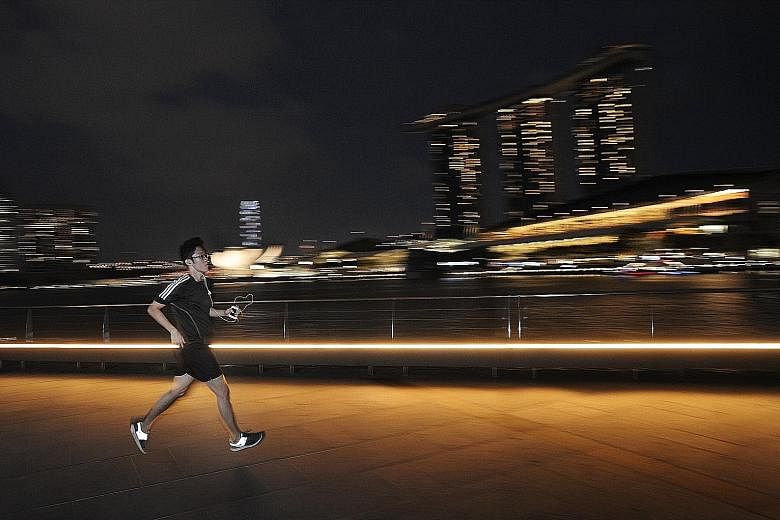WASHINGTON • It is never advisable to run during the hottest part of the day. In addition to the acute risks of sunburn and heat rash and the long-term cancer risks of sun exposure, exercising in a hot environment can cause fluid shifts in the skin as you sweat, stretching and damaging your skin and increasing the likelihood of wrinkles and fine lines.
So why not run in the cooler hours at night? Already, there are plenty of people of all ages who work out in gyms in the early evenings after work or school.
But for those who want to pound the streets in the late hours, they might have some reservations on what possible effects running at night can have on their sleep habits.
WORKOUTS DON'T DISTURB SLEEP
"Most people used to think it was too energising to exercise in the evening," said Charles A. Czeisler, director of the division of sleep medicine at Harvard Medical School.
However, Czeisler, whose medical practice includes providing sleep consultations to professional athletes and sports teams, said he is not aware of any evidence that supports an adverse impact from evening exercise.
Particularly for people who are training, no matter what time of day, exercise actually helps to increase the depth, or quality, of sleep, he said.
"Exercise in the evening does not disturb sleep and can even promote sleep a little bit," said exercise science specialist Shawn Youngstedt, professor of nursing and innovation at Arizona State University, who is in the third year of a four-year study of veterans with sleep apnoea.
"Exercise ending even a half-hour before bedtime does not disturb sleep for most subjects."
EATING TIMES AFFECT SLEEP
It is not so much when you exercise that affects sleep, but perhaps how consistent you are with your wake time and your sleep time as well as with what you eat and when, Czeisler said.
The idea is to try to keep the interval between your first meal and your last meal of the day on the order of 12 hours or less, according to Czeisler. That means if you're having breakfast at 8am, you don't want to eat dinner after 8pm.
In addition, eating a meal after your body begins to release the hormone melatonin - which happens after the sun sets - and helps to maintain glucose levels during the night, he said, can interfere with your circadian rhythm, which ultimately has the greatest impact on your sleep.
And that's where evening workouts can be tricky. To train optimally, a person who eats breakfast at 8am would need to finish running (and stretching) at least by 7.30pm to finish eating at 8pm.
"People should exercise when it is convenient," Youngstedt said, "and when they can consistently do it."
"The three pillars of good health are nutrition, exercise and sleep," Czeisler added. "But they shouldn't be at odds with one another.
"Exercising at four o'clock in the morning and therefore not sleeping or getting up at five and losing two hours of sleep in order to exercise is a bad idea, just as eating in the middle of the night is a bad idea."
In addition, Czeisler said that long-distance running can increase your sleep needs, which can average between seven and nine hours, depending on your age.
HOW TO EAT
According to Philadelphia sports dietetics specialist Kelly Jones, if you're planning to exercise in the evening, it's important to eat throughout the day to fuel your workout and to prevent overeating afterwards.
Yet don't be tempted to exercise and then go to sleep without eating. Said Jones: "The same fuelling and recovery principles apply, no matter what time of day you are moving your body."
She recommends a balanced breakfast and a mid-morning snack, which would allow you to eat lunch later in the afternoon. "You want lunch to be a slightly bigger meal than usual," she said, "while staying away from fried foods and excessive saturated fats."
This way, a snack two hours prior to exercise can help fuel the workout and prevent excessive hunger. After exercise, it is advisable to consume a combination of carbohydrates and protein within an hour.
Specific foods to avoid at night include anything with excessive sugar or any caffeine, Jones said.
It's important to eat even if you're going to sleep not only because you just exercised, but also because the growth hormone that is released after you fall asleep (which aids in muscle recovery) depends on protein and carbohydrates, Jones said.
She added that if you're exercising for longer than an hour, even in the evening, you should consider fuelling during the workout. Many popular sports gels and energy drinks contain caffeine, however, so check the label before consuming, she said.
Czeisler noted that caffeine can stay in your system for up to nine hours. This means you could still experience the effects of about half the amount of caffeine from the cappuccino you drank at lunchtime as late as 9pm.
WASHINGTON POST

